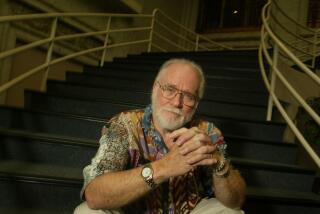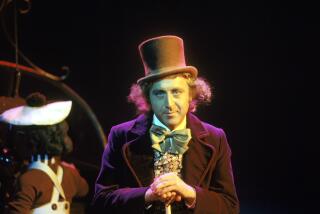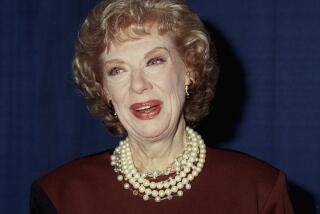Irving Fein dies at 101; manager for Jack Benny, George Burns
Irving Fein was a veteran Hollywood studio publicist when he began his 28-year association with Jack Benny in 1947, first as the popular radio comedian’s publicity and advertising director.
One of Fein’s successful ideas was to promote Benny’s new television program on CBS in 1950 via a full-pageMacy’s ad in New York newspapers: a photo of the famously “cheap” comedian shopping at the department store, with the headline: “MORE PROOF THAT MACY’S IS VERY KIND TO THE POCKETBOOK ... JACK BENNY SHOPS HERE!”
Then, when a new Macy’s executive turned down Fein’s idea of running another full-page Benny ad the next year, Fein simply went across the street to the competition, which jumped at the opportunity with its own newspaper ad: “JACK’S NO DUMB BUNNY ... HE SHOPS AT GIMBELS.”
Fein, who became Benny’s executive producer and personal manager and later helped revitalize the flagging career of George Burns, died Friday of congestive heart failure at his home in West Hollywood, said family friend Larry Solters. He was 101.
In his 1976 book “Jack Benny: An Intimate Biography,” Fein wrote that soon after going to work for Benny, he came to love him “as I would a father or a son, a father because he was so much older than I and a son because he always seemed so helpless and dependent in everything but the creation and performance of his program.”
In 1955, Fein left Benny to take a job at CBS in New York as vice president in charge of advertising and promotion.
But Benny would call him at least two or three times a week, and after only a couple of months, the comedian asked him to return to Hollywood to become president of his newly formed J & M Productions, which produced Benny’s TV show and series such as “Checkmate,” “The Gisele MacKenzie Show” and “Ichabod and Me.”
Fein executive-produced Benny’s weekly series, accepting an Emmy Award in 1961 when it won for outstanding program achievement in the field of humor, until it ended in 1965. He then executive-produced Benny’s TV specials and traveled extensively with him on his various performing engagements.
Two months before Benny died of pancreatic cancer in December 1974 at age 80, Benny suggested that Fein become his pal Burns’ personal manager.
Gracie Allen, Burns’ wife and comedy partner, had died in 1964. And, Fein recalled in a 1998 Archive of American Television interview, “George hadn’t done well for about 10 years. He worked very little.”
After Benny died, Fein pressed producer Ray Stark to audition Burns for the role of the old vaudevillian that Benny had been slated to play opposite Walter Matthau in the movie version of Neil Simon’s “The Sunshine Boys.”
The role earned Burns an Oscar for best supporting actor in 1976 at age 80 and rejuvenated his career.
Fein, who has been described as a gentleman and master negotiator, decided what jobs Burns would or wouldn’t take. But, as Burns pointed out in a 1989 Times interview, “I follow Irving’s advice, unless I don’t like it. Then I say no. I have my own mind about things.”
Fein, who executive-produced Burns’ TV specials and was a producer on his 1979 movie “Just You and Me, Kid,” was Burns’ personal manager for 22 years, until the cigar-smoking comedian died in 1996 at age 100.
“I’ve been lucky,” Fein told the Associated Press in 1988. “I’ve been able to work with the best of them.”
Born in Brooklyn on June 21, 1911, Fein graduated from Alexander Meiklejohn’s Experimental College at the University of Wisconsin and later earned a law degree at Brooklyn Law School while working in the publicity and advertising department for Warner Bros. in New York City.
But after deciding that show business was more exciting than law, he joined the Warner Bros. publicity department in Burbank in 1936. Similar jobs followed at Columbia Pictures, Samuel Goldwyn and MGM before he went to work with Benny.
Fein is survived by his wife of 43 years, Marion; two children from a previous marriage, Dr. Michael Fein and TV producer Tisha Fein; his stepson, Dan Schechter; three granddaughters and four great-granddaughters.
More to Read
Start your day right
Sign up for Essential California for the L.A. Times biggest news, features and recommendations in your inbox six days a week.
You may occasionally receive promotional content from the Los Angeles Times.






